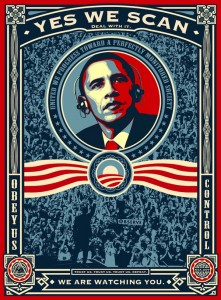Congress Fails to Limit NSA Surveillance Using Patriot Act Loophole

NSA Surveillance includes the collection of your phone and email records for the sake of detecting and disrupting terrorism. The practice has proven effective, but the scope of the data collected (every phone call and email available, even if you are innocent) has raised eyebrows.
Congress, in a rare show of bipartisan agreement, may be leaning toward limiting the amount of data the NSA can collect.
Rep. Justin Amash, R-Mich., backed by Rep. John Conyers, D-Mich., put forth an amendment that would restrict the NSA’s ability to collect data under the Patriot Act on people not connected to an ongoing investigation. The action was initiated after Edward Snowden, a government contract worker, leaked highly classified data to the media, revealing that the NSA has secretly collected phone and email records on millions of Americans without their knowledge or consent.
The bipartisan support was counterbalanced by a bipartisan effort to defeat it, with both House Speaker John Boehner and House Democratic Leader Nancy Pelosi opposing it. In the end, the amendment to a defense spending bill was narrowly defeated by a vote of 217-205.
Still, the close vote may be indicative of a changing viewpoint in Washington: that NSA Surveillance should have oversight. As Rep. Jim Himes, D-Conn., an Intelligence Committee member stated, “I think as more and more people come to understand the breadth of the authorizations that the NSA and other intelligence agencies have, they start to get a little worried about the encroachment on their privacy, and that’s absolutely fair.”
Himes stressed that the NSA is not out of bounds with their actions. “They are acting pursuant to very clear authority under Section 215 of the Patriot Act,” Himes said. (215 provides authority for the surveillance programs.) But, he said, “that law is too broadly worded and being interpreted a little broadly.”
When the Patriot Act was introduced, there was an implicit understanding that the bill would come with a sunset period. In other words, the Act would be rolled back as the threat diminished. That rollback has never really taken place, and the NSA continues to exploit our short term memories by utilizing 215 to gather more information than the average American, heck, the average Congressperson, would be comfortable with. Once power is given, it’s exceptionally difficult to take it back. But Congress may be moving in the right direction.
Will Adams, Amash’s press secretary pointed out, “It was the first time that either house of Congress has gone on the record concerning NSA’s blanket surveillance since the NSA leaks started coming out.” He continued, “We got 205 votes despite the fact that we were up against the entire establishment in Washington…The civil liberties of Americans is not a partisan issue.”
Bill sponsor Conyers said in a statement to reporters, “This discussion is going to be examined continually … as long as we have this many members in the House of Representatives that are saying it’s ok to collect all the records you want just as long as you make sure you don’t let it go anywhere else. That is the beginning of the wrong direction in a democratic society.”
Despite the defeat, the debate has led to talk of cutting funding and denying the NSA the authority to continue its data collection. Talk in Washington, however, seems to be fairly cheap. Rep. James Sensenbrenner, R-Wis., cautioned the administration that if it “continues to turn a deaf ear to the American public’s outcry, Section 215 will not have the necessary support to be reauthorized in 2015.” He further stated, “The proper balance between privacy and security has been lost.”
I’m not suggesting that the entire NSA program be scrapped, I’m simply asking for more transparency as to what is being gathered, and a certain assurance that private data is only being collected and retained on suspects actually under suspicion, not on every American citizen.
John Sileo is a cyber security keynote speaker and CEO of The Sileo Group, a privacy think tank that trains organizations to harness the power of their digital footprint. Sileo’s clients include the Pentagon, Visa, Homeland Security and businesses looking to protect the information that makes them profitable.
Sorry, comments for this entry are closed at this time.









No Comments Yet
You can be the first to comment!